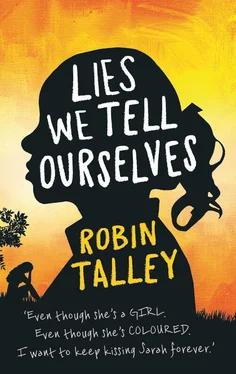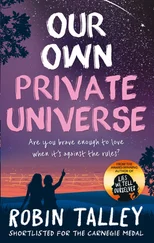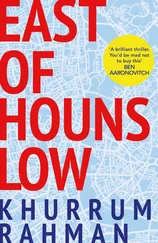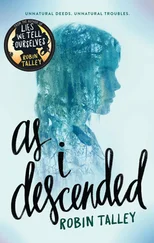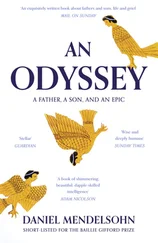1 ...7 8 9 11 12 13 ...21 I start to panic. Then I remember none of the white people know my name.
Mr. Muse is coming toward me, a bucket swinging from his hand and a wide smile on his face.
“Mr. Muse!” I grin up at him. He’s the tallest man in our church, nearly a foot taller than Daddy. His wife is in the choir with me, but I’d forgotten he worked at Jefferson. He sets his bucket down on the floor, peels off one of his rubber gloves and holds out his big hand to me. I clasp it, ignoring the looks and snickers from the white people. Mr. Muse’s hand is warm in mine.
“Bless you, Sarah,” he says, beaming down at me. “You know we’re all real, real glad to see you here.”
I can’t find words to tell Mr. Muse how glad I am to see him, too. His is the first friendly face I’ve seen in I don’t know how long.
“Now you just remember, we’re all so proud of you.” Mr. Muse drops my hand. He bends down to retrieve his bucket with the mop handle poking out the top. “And you’re surely making your mama and daddy proud, too.”
“Thank you so much, Mr. Muse, sir,” I say.
“Sir?” the girl behind me snickers in a high-pitched voice that she probably thinks sounds Northern. Like me. “Leave it to a doggone dirty nigger to call the doggone dirty janitor ‘sir.’ You get on out of here with your stinking bucket, boy.”
Mr. Muse acts like he didn’t hear the girl. He smiles at me again, then turns to leave the cafeteria, whistling that jazz tune they’ve been playing on the radio all winter.
I wish I could keep clasping Mr. Muse’s big warm hand for the rest of the day.
Usually when I see Negroes working as janitors or cleaning women, I get embarrassed. I understand why they’re doing it—it’s hard enough to find jobs as it is—but I hate to think of any of us mopping up spilled food we wouldn’t be allowed to eat if we were paying customers.
But the food in this cafeteria isn’t only for white people anymore. I’m here now.
I smile as I make my way through the lunch line. I take a double helping of green beans, my favorite, from the lunch ladies who pass me a tray without meeting my eyes. I will eat green beans today. The same green beans the white people get to eat. Because that’s my right. Mr. Muse and the others are counting on me to prove that it’s so.
But when I come out of the line Mr. Muse is long gone. The only black face in the room is mine.
The tables are arranged in long rows. There are almost no empty seats left. I was near the back of the lunch line, since I was late getting to the cafeteria. Groups of boys kept blocking my way in the halls.
One table has a few empty seats at the end. I move toward it, carefully stepping over the feet stuck out in my path, and set my tray on the painted wood surface.
Right away there’s a murmur from the white people nearest me. And then everyone sitting at the long table—there must be thirty of them—stands up.
“I can’t eat with this stench,” one girl says.
“I know. I lost my appetite.”
“They’re going to have to bleach this whole table to get the smell out.”
They leave, squeezing into other tables. Some of the girls are sharing seats. The boys hold their trays in their hands, trying to shove food in their mouths standing up.
I pretend not to notice. I pretend not to hear the laughter all around me. Or the new rounds of taunts that come with it.
I know I don’t really smell, but I still want to take about fifty showers when I get home to make sure.
No. I can’t think that way. I can’t let these white people get to me.
I’m lucky, really. I have a whole table to myself.
But I don’t feel lucky.
I take a bite of my green beans. They taste like rubber.
Just then, a girl shrieks near the end of the line and I forget all about my food. What if it’s Ruth?
I stand up fast, ignoring the boy behind me who calls me a damn nigger when my chair bumps into his, and crane my neck to see what’s going on in the line.
It’s not Ruth. The shrieking girl is white and blonde. She’s standing with a group of friends, covering her face with her hands.
Ten feet behind her Ennis is backing away slowly, gripping his tray, his eyes surveying the room.
No one else seems to have noticed the girl’s shriek. I sit back down. Whatever’s going on, I don’t need to draw more attention to it.
Ennis sees me and makes his way over, casting looks back at the blonde girl. She’s crying. Her friend pats her arm.
Ennis swiftly lifts his tray away from a boy who’s trying to knock it over and puts it down on the table across from me.
“What happened?” I nod toward the blonde girl.
Ennis sits down, shrugs and stirs his applesauce. “I don’t know. I walked by her, and she took one look at me and started screaming. You’d think she’d never seen a colored man before.”
Oh. I hadn’t thought about that. I wonder how many other girls at this school are going to scream whenever one of the Negro boys crosses their paths.
For years now, ever since we moved down here, I’ve been listening to Mama and Daddy talk about integration. Sometimes at night Ruth and I sneak out of our room and sit on the top step in our nightgowns, listening to our parents’ voices drift up the staircase. Mostly they talked about the court cases. That part was boring, but sooner or later they’d stop talking about injunctions and petitions and hearing dates and start talking about what integration might really be like for us. Once, when it was so late Ruth had fallen asleep, I heard Mama whisper to Daddy that what worried her most was our Negro boys. The white parents might give a dozen reasons for opposing integration, she’d said, but what they were really worried about deep down was their girls being around our boys. She never said exactly what worried them about that, though. Intermarriage, I suppose. The idea that black boys might get their nice white girls in trouble.
I don’t like to think about that sort of thing. It makes me blush. Besides, no Negro boy I know would ever risk going near a white girl. A few years ago a boy down in Mississippi got killed for doing a lot less than that.
“Hey, I saw your sister after second period,” Ennis says. “She was all right.”
I jerk up in my seat. “You’re sure? She wasn’t hurt?”
“She looked great. Walking down the hall with her nose in the air. From the way she acted you wouldn’t even know there was anyone yelling.”
I’m relieved, but at the same time I want to cry. “People were yelling at her?”
“Well, yeah. But no worse than the rest of us.”
I nod. “Thanks for helping her this morning. With those boys on the way in. I was so worried.”
“Oh. Sure.” He shrugs like it was nothing.
“I wish I could see her,” I say. “During the class breaks, just to make sure she’s all right. Then I wouldn’t have to worry all day. But I don’t even know where the freshmen classes are.”
“They’re all mixed together.” Ennis opens his notebook and turns to a blank sheet. He sketches out the school’s first floor, second floor, third floor and basement. “This is where I saw her this morning. She must have a class near there.”
He draws blocks around the Math, English, History and Science sections of the school, then draws in the stairwells and puts stars next to the gym, cafeteria and auditorium.
“How do you know all this?” I ask him.
“Mr. Muse snuck Chuck and me in during one of his shifts last summer. He wanted to make sure we knew our way around in case there was trouble.”
Right. Just in case.
“This is the main entrance.” Ennis draws a big X. “Where we’ll never go in again if we can help it.”
“You really think it’ll make a difference?”
Читать дальше
